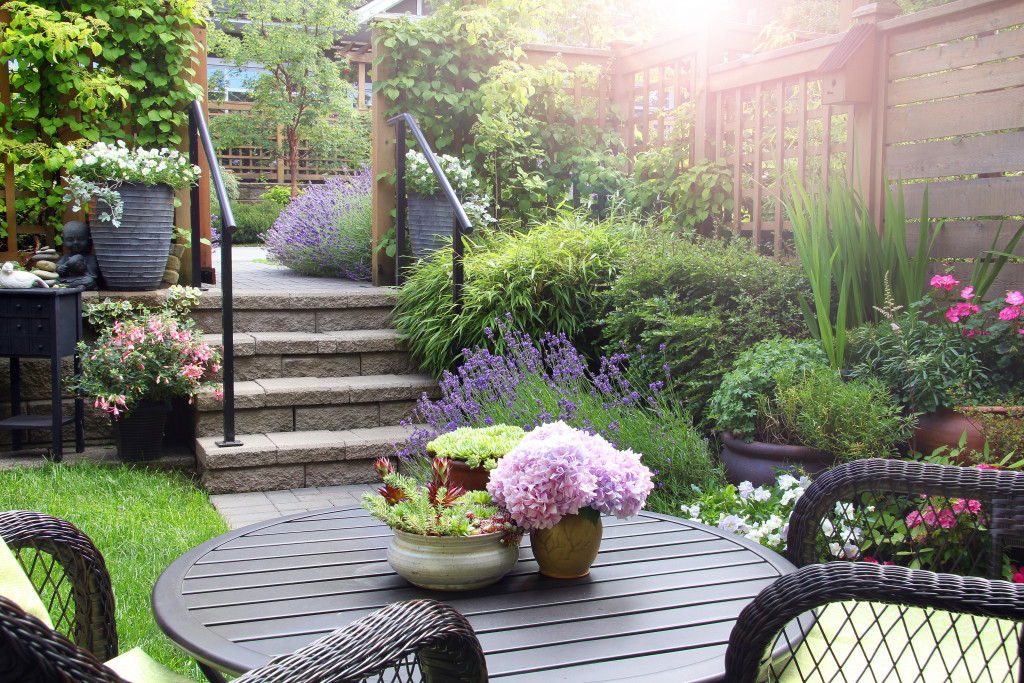Even if people now see some sense of normalcy, it will never be the same pre-COVID. Many workers are still frightened to go back to work. Some are even thinking of quitting if they will be asked to report into the office and quit their work-from-home setup.
The level of uncertainty remains high and will continue to do so until the vast majority around the globe can achieve stability. If there’s one thing that remains consistent, however, it’s how landscapers, gardeners, and commercial mowers are essential in so many ways, especially among those planning to go back to office work.
Both outdoor and indoor plants can provide a wide range of benefits for the weary, scared, and anxious souls:
1. Parks Can Encourage People to Walk
Engaging in physical activity is one of the best ways to help deal with the ongoing COVID-19 pandemic. First, obesity is still an independent risk factor for the disease, including severity and hospitalization.
Second, movement can help decrease feelings of loneliness, anxiety, and stress. A 2019 research in Current Sports Medicine Reports showed that higher levels of physical activity and exercise can help ease symptoms of depression.
This could be because exercise can boost the release of endorphins or feel-good hormones that improve mood, motivation, and feelings of reward. It may also redirect one’s attention from rumination, according to the Mayo Clinic.
Physical activities like walking also encourage people to go out more often and hopefully soak up the sun early in the morning. Sunlight is still one of the best ways to produce vitamin D, which promotes immune regulation and better mood.
Not everyone, though, can meet the daily recommended physical activity, which is at least 30 minutes of moderate exercise. This is where parks and landscaped gardens can be helpful.
In a 2014 study in the International Journal of Behavioral Nutrition and Physical Activity, both park facilities and proximity were strongly associated with park-based physical activity and use. The nearer the park and the more complete it is, the more likely a person visits and uses it.
2. Indoor Plants Can Improve Focus and Productivity
When employees go back to work in the office, companies need to prepare for people who can’t focus. That’s one of the significant effects of pandemic stress and trauma. As early as now, they need to develop strategies to support these workers’ mental health, so they can continue to be productive and capable of doing their jobs.
Interestingly, one great option is adding indoor plants. A 2014 UK study that compared lean and green offices revealed that workers surrounded by foliage were at least 15 percent more productive than those in spartan workplaces.

The reason is simple: humans are biophilic. People are designed to commune with nature, and we will always seek it. We go to the mountains on weekends to camp, grow plants at home, love to stay in wooded cabins, and, yes, feel better when they’re around.
3. Seeing Plants Can Help Lower Stress and Anxiety
Humans’ biophilic design also leads to one more benefit to seeing plants: it can help lower stress and anxiety. The 2020 study by the University of Hyogo, Japan, explains it through experiments.
The team worked with over 60 participants who took an exam while fatigued. Then, they introduced a control period where employees weren’t exposed to plants and an intervention phase. Here, they can either look at the plants (passive interaction), take care of them (active interaction), or both.
The results of the study suggest that employees who saw and interacted with plants experienced lower levels of stress and anxiety. However, just by looking at them can already produce the same results. Even better, the outcome was consistent regardless of the age of the participants.
4. Plants Can Give a Feeling of Purpose
The Okinawans of Japan are less likely stressed than the rest of the world because they have moai, a community that gives their lives a sense of purpose and meaning. A study also seems to back that.
A 2013 research in PLoS One revealed that purpose could help predict a person’s recovery after being exposed to a negative situation or event like the COVID-19 pandemic.
Plants can give people purpose when they take care of them and ensure they thrive. In fact, they may even become a living metaphor for surviving the pandemic: the plant remains steadfast and eager to grow despite the different natural elements.
Landscaped gardens, parks, and vertical walls are not only for aesthetics. They can provide excellent support to employees trying to cope with the new normal.

